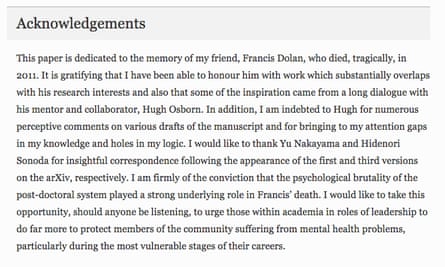Every scientist knows how difficult it is to get a research paper published; reviewers may take exception to the way a study might have been run, or the way the data are analysed, or how the results have been interpreted. It’s part of the process, and hopefully, the end point is a more scientifically useful paper, something that adds new meaning to a research discipline.
When Oliver Rosten sent a new paper to the Journal of High Energy Physics (JHEP), ultimately it wasn’t rejected because of the science – this was deemed sound. It was because of the acknowledgement:

Rosten met Francis Dolan in 2006, when they were both working on two-year fellowships funded by the Irish Research Council. “We got on well from the start – we had the same sense of humour, and became pretty close friends,” recalls Rosten. “But both of us for different reasons found our time in Dublin to be very stressful.” Indeed, Rosten has since taken a job outside of academia.
Compounding this was a long-term history of depression. “Francis suffered for all of his adult life from depression – I think manic depression,” explains Rosten. “He had staggering creativity as part of that. When he was in the groove, he had these staggering work benders, disappearing for a period, and then emerging with some remarkable new result.”
The postdoctoral period is one of the most difficult in the academic career ladder. Very often, researchers in these positions live on a cycle of short contracts that give them as little as six months to work on a project. It can end up being an extremely isolating experience, especially if it requires a move to a different city or country. Over the course of five years, Dolan held positions in Cambridge, Dublin, Southampton, Amsterdam and Crete, most of which meant living away from his partner.
Around the time he started his stint in Crete, Dolan died by suicide in 2011, at the age of 34. Rosten firmly believes that the nature of the postdoctoral system contributed to Dolan’s death. “There’s this backdrop of short-term contracts, which can often be poorly paid in absolute terms,” he says. “Then this constant moving is a key thing, particularly for those suffering from mental health issues, because basically every couple of years your entire support network can disappear overnight.”
Most work on mental health issues in universities tends to focus on undergraduate or postgraduate students. Yet despite forming the backbone of most academic research, postdocs are often completely missing from this research. That being said, there is some evidence that in comparison to other occupational groups, the overall mental health of those working in academic is relatively poor – in particular, levels of depression and anxiety tend to be inflated. A Guardian survey in 2014 of 2500 academics with self-reported mental health issues suggested that 66% of people agreed that their problems were directly related to their university work. Similarly, two-thirds reported that they had not spoken to anyone in a senior position about their mental health.
Given the lack of data, a recent report commissioned by the Royal Society and Wellcome Trust has argued for the need for more research specifically on the prevalence of psychological distress in postdoctoral populations. Alongside this, it pushes for the development of a standard model for assessing stress and psychological distress in research environments, with a view to developing better quality interventions.
Rosten would like to see more done at the university level. “Part of the thing that I would really like to see change is every institution have staff whose sole role it is to help the postdoctoral community, particularly at the start, and particularly in terms of training in mental health issues,” he says. One role that these sorts of staff members could have is to make sure that the transition between institutions at the start and end of postdoctoral contacts ensures continuity of mental health care provision – although this idea isn’t without its own issues surrounding logistics and confidentiality.
As for Rosten’s rejection from JHEP, a terse email from the handling editor convinced him to withdraw the paper. “They asked for the acknowledgement to be changed, and I said that I couldn’t do it – it’s an important part of the work for me,” he explains. The editor’s email, in many ways, summed up many of the problems that Rosten was trying to highlight:
I think the first phrase is too much: I guess there were more basic problems in Dolan’s life than the pressure put by physics work. Certainly people, say in businness [sic], behave more brutally than in academia. The second phrase could be OK but a bit out of place: in a scientific paper we discuss about science, not about life.
After a number of other rejections, some based on the scientific content, some based again on the acknowledgement, he eventually decided to contact handling editors directly to see if they would consider keeping the acknowledgment intact if it were to be accepted. “One journal ignored me, but the next journal I came to sent me an incredibly supportive email and said absolutely, this is a really important thing to say.” The paper was published in the European Physical Journal C in July. Rosten is ambivalent about the journey. “Because I wasn’t in academia, I had the luxury of knowing that when I was withdrawing the paper from each journal that it couldn’t harm my career. I’m certain that I would have made the same decision if I was in academia, but realistically I would have paid a price for it.”
When they parted ways after their time together in Dublin, Rosten and Dolan would send each other long emails every few months to keep in touch. Shortly before he died, Rosten was planning on sending him a message – but job interviews got in the way. He explained to me that he will always regret not having the chance to send that last email. Hindsight often has a way of leaving us with indelible marks in this way. But the message in Rosten’s acknowledgement, now a permanent fixture in the scientific record, is perhaps a fitting legacy to the memory of his friend.
